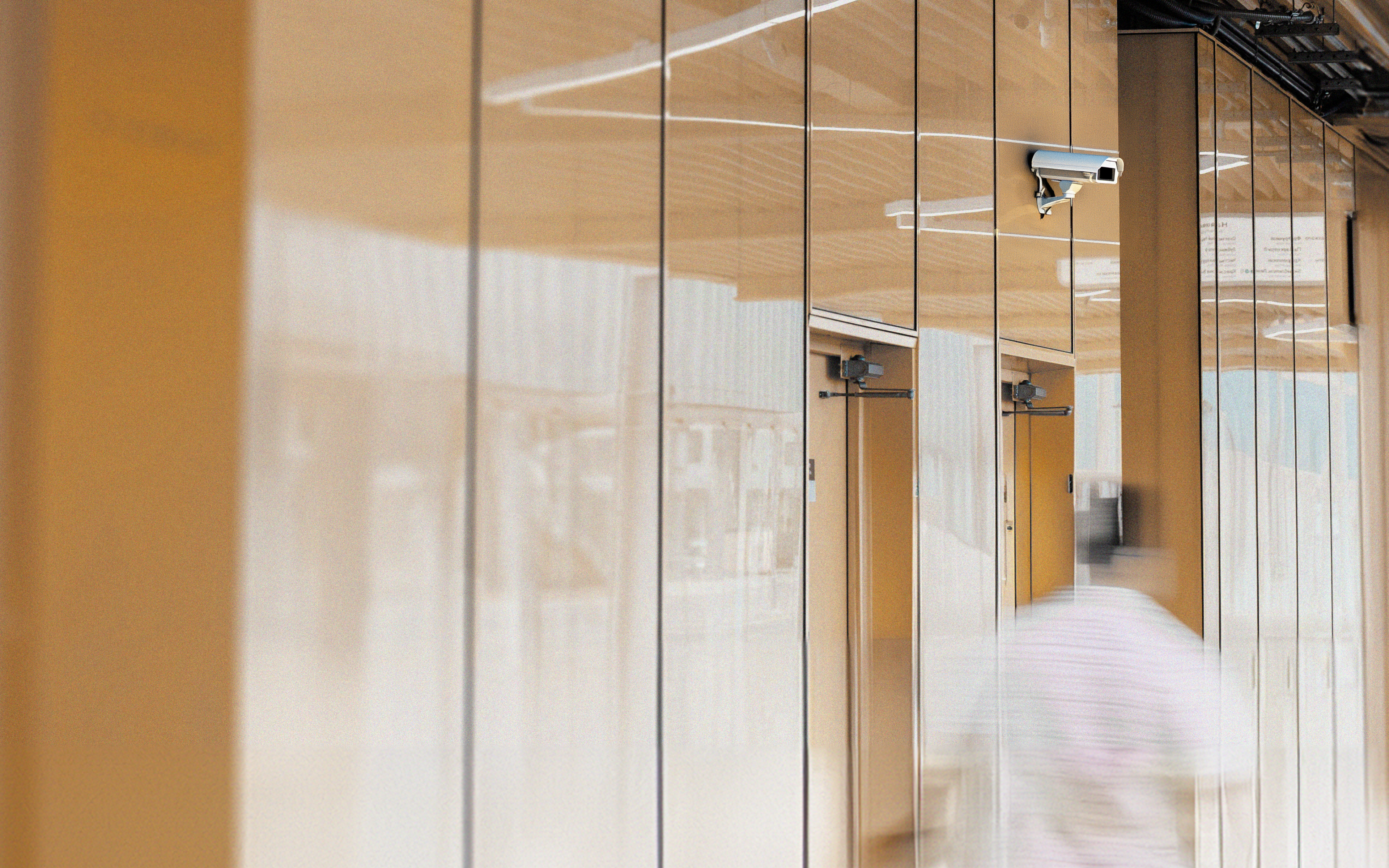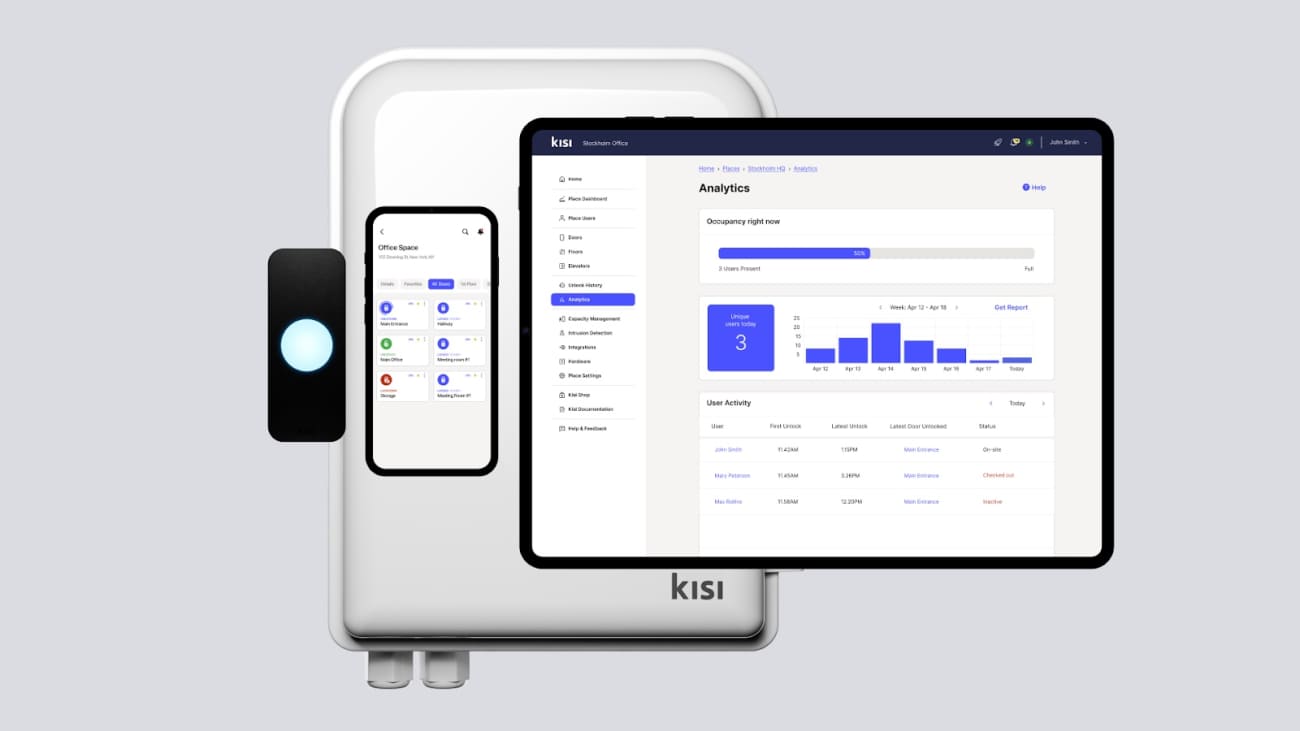Today’s businesses have a lot of security issues to worry about—cyberattacks, property theft, and vandalism, just to name a few. Preventing these and other events requires careful planning and a strategic approach that targets your unique security vulnerabilities. Comprehensive corporate security allows you to protect your organization from every angle. In this article, you’ll learn what corporate security is, why you need it, and how to choose a corporate security system for your business.
What is corporate security? #
Corporate security is a combination of policies, tools, and procedures that businesses use to prevent incidents that could endanger their assets and interests. It keeps workers, data, and property safe by addressing risks such as theft, fraud, natural disasters, and cyberattacks.
Types of corporate security #
Corporate security encompasses all the elements of your business that you need to protect. When you implement measures and solutions within your organization, keep in mind the different types of security you’ll need to address:
- Physical: Physical corporate security involves protecting tangible assets, such as your premises and equipment. It includes access control, surveillance, and alarms, all of which help deter, prevent, and identify property crime.
- Human or personnel: Your business has to ensure that everyone who enters your premises—from employees to contractors to visitors—is trustworthy and doesn’t present a security risk. Human corporate security often involves issuing security clearances, evaluating background checks, and preventing tailgating and unauthorized access to restricted areas or information.
- Information: Your digital assets are equally as valuable and vulnerable as your physical ones, and information security involves protecting your company’s sensitive information. This typically includes mitigating the risk of data breaches and cyberattacks through cybersecurity protocols, such as firewalls, encryption, and system updates.
To safeguard your business from a physical, human, and information standpoint, you’ll need a corporate security system with a variety of tools and technologies.
Key components of corporate security systems #
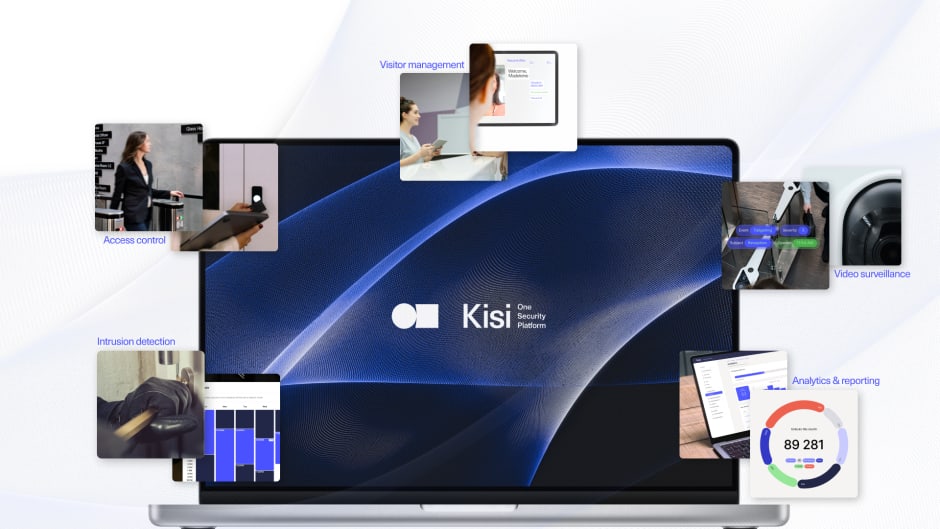
In addition to developing and instituting detailed policies and procedures related to security, most businesses also install a corporate security system. Your system will be unique based on the design and size of your building, the function of your business, and any specific vulnerabilities you face. However, most usually include these core elements:
- Access control systems: These systems control who enters and exits your building, allow you to issue temporary or permanent access credentials, and—with a solution like Kisi—alert you to events like attempted intrusions.
- Video surveillance: A combination of video cameras and software allows you to continuously monitor different areas on your premises, such as entrances and elevators, and record security incidents.
- Alarms: Alarm systems can alert you to criminal activity, such as break-ins, as well as threats like fire, smoke, and carbon monoxide.
- Cybersecurity solutions: Cybersecurity tools such as firewalls, anti-virus software, and multi-factor authentication prevent unauthorized individuals or groups from accessing your company computers, servers, and internal data.
Access control, video surveillance, and alarms are all essential to your physical and personnel security, but keep in mind that they’re also vital when protecting your digital files. While cybersecurity measures play an important role, the other components help prevent people from manually infiltrating your computers or stealing your hardware, which could ultimately allow them to access confidential data.
Why do businesses need corporate security? #
Security threats in the modern world are complex, making it increasingly difficult for businesses to protect themselves. Corporate security allows you to deter and respond to these threats, offering substantial benefits for your organization and everyone connected to it.
Securing assets #
One of the primary goals of corporate security is shielding your physical assets from misuse and damage. More specifically, corporate security can help prevent tampering, vandalism, and theft of assets such as:
- Inventory
- Tools
- Equipment
- The structure of the building itself
Property damage and theft can lead to financial and productivity losses, so securing them can save substantial amounts of money over time. In 2023, around 25% of small business retailers in the United States reported losing between $1,500 and $2,000 every month to theft.
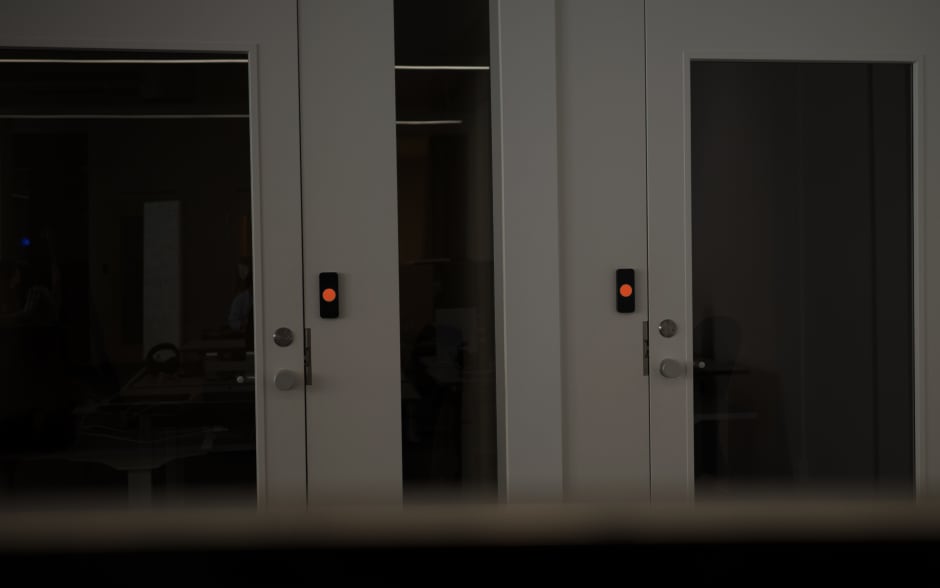
Protecting people #
Corporate security also ensures that your employees, customers, clients, and guests aren’t in harm’s way while on your premises. A corporate security system can prevent injuries from violent crime as well as natural disasters. It lets everyone on site know when a threat is present and can help stop dangerous situations from developing. It also alerts emergency responders when an incident occurs so they can quickly offer support and medical treatment when needed.
Shielding sensitive information #
Employee and customer information, including social security numbers and payment details, should never fall into the wrong hands, and corporate security is key to making sure that doesn’t happen. According to the Identity Theft Resource Center, the number of data compromises in the United States increased 78% from 2022 to 2023. Organizations in certain industries, including healthcare, financial services, and manufacturing, are at especially high risk. Businesses with corporate security systems can halt cyberattacks and prevent data breaches from occurring.
Minimizing costs and financial losses #
Implementing a strong corporate security system means you don’t necessarily need round-the-clock security staff. Automated access control and video surveillance reduce operational costs by enabling you to streamline operations and keep eyes on your business even when no one is present. It can also reduce financial losses due to property theft, regulatory penalties, and civil lawsuits that occur when people are physically injured or experience other types of harm, such as identity theft, because of crime targeting your business.

Avoiding downtime #
Corporate security is also vital to limiting both short and long-term downtime. With the right system, you can respond more effectively to emergency situations, ensuring disruptions don’t keep employees from completing their daily work. On a smaller scale, employees are more productive when corporate security automation assists with redundant tasks like unlocking doors.
Challenges in implementing corporate security #
While a corporate security system is more than a worthwhile investment, implementing it can come with some obstacles. In particular, you might encounter complications when integrating the new system with any legacy systems in your business. Organizations that already have one or more corporate security solutions in place may want to continue using some of their existing hardware and software. Unfortunately, some systems lack compatibility, requiring you to replace all the elements you currently have in place. Kisi solves this problem by offering multiple migration options that allow you to continue the aspects of your legacy systems that you want to keep.
Another concern for many companies, particularly when it comes to data security and accessibility, is regulatory compliance. Some corporate security systems may not have adequate protections for the requirements in your industry. Others, such as access control systems, may make it difficult or impossible for people with limited mobility to pass through barriers or doors. Kisi offers flexible credential options, including contactless unlocks with MotionSense and the top-rated mobile app, to accommodate all users and ensure your building is accessible.
How to choose the right corporate security system #
Corporate security systems come in many different configurations, and it can be a struggle to decide which is most appropriate for your organization. These are some points to consider when examining your options:
- Interoperability: A system like Kisi that integrates various components, including existing hardware and software, and offers an open platform that connects important security components, like visitor management, video surveillance, and access control, makes it easier to keep your building secure and connected.
- Features: Look for a system that offers robust features, such as intrusion detection and data analytics, and enables hybrid work security. To future-proof, choose a cloud-based system that constantly works on adding new, advanced functionalities.
- Scalability: A system that offers global management allows you to add more users, doors, spaces, and locations, adapting to your business as it expands.
- Remote management: You can manage your building security from anywhere with a cloud-based system with an intuitive dashboard that allows you to view video fees, unlock doors, and respond to alarms from a distance.
In addition to these general characteristics, you’ll need to think about your business’s specific needs. Start by looking at past incidents in your organization, your current circumstances, and your anticipated needs for the future. For example, you might expect to grow your business significantly in the coming years, in which case scalability would be a top priority for any corporate security solution you choose.
Emerging trends in corporate security #
Corporate security has changed radically over recent decades, as technological advances have introduced innovative ways for businesses to defend themselves against physical and digital attacks. That pattern is likely to continue in the coming years, as further developments allow organizations to take greater control over what happens on their premises.
Cloud-based access control #
One of the most transformative solutions is cloud-based access control. In the past, businesses had to issue and keep track of physical keys that were easily lost, stolen, or damaged. Welcoming a temporary visitor meant having a guard, receptionist, or worker available to unlock the door. And a single missing key could result in the expensive process of replacing multiple locks in the building.
In contrast, cloud-based access control allows businesses to manage employee and guest credentials from any location using a variety of access control methods. Organizations that want to go completely digital can allow their workers to use their phones, smartwatches, or Apple Wallets to open doors. When short-term visitors, such as contractors or clients, need access to the building, it’s easy to grant them temporary access through a link or QR code.
Moving forward, businesses will continue to embrace the advantages of cloud-based access control. It allows business leaders to work from home or travel as needed without worrying about whether an employee won’t be able to open the door. Similarly, if someone attempts to gain unauthorized access or holds open a door, a cloud-based access control system can alert you no matter where you are at the time.
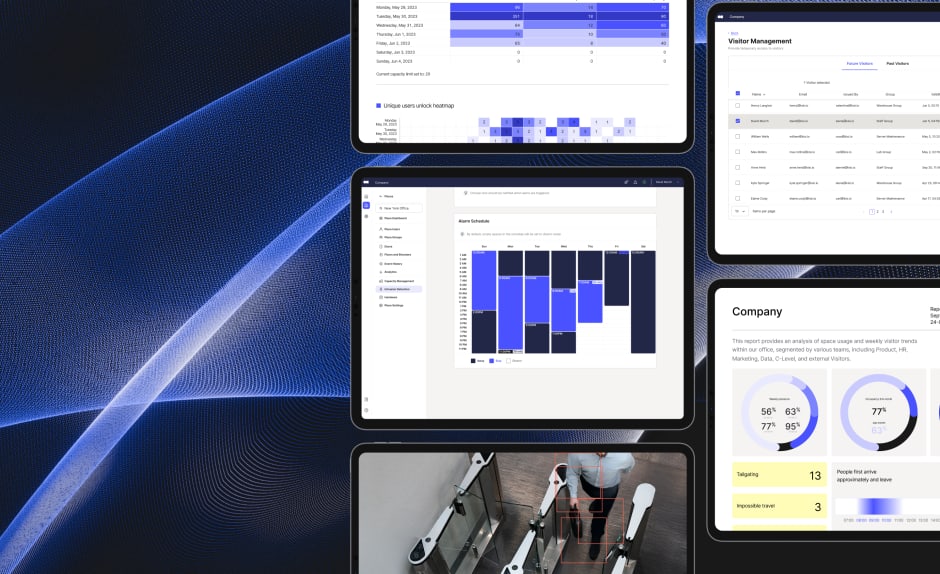
Automation and artificial intelligence #
Automating different aspects of corporate security saves time and mitigates against many different risks. For example, automated door lock schedules ensure that a forgetful employee doesn’t put your business at risk after hours.
Artificial intelligence (AI) will enable enhanced automations by offering deeper insights and analysis of security risks. Some future solutions may also use AI to predict security incidents before they happen based on patterns and anomalies, allowing you to close gaps in advance.
Interoperable security systems #
Having a cohesive security system helps to reduce vulnerabilities for your business and ensures you have a clear picture of your premises at all times. That’s why interoperability has become a central feature of successful corporate security solutions. When systems are interoperable, they’re compatible, flexible, and scalable.
For example, Kisi has multiple integrations with many other security solutions, such as video surveillance systems. In addition, the Kisi One Security Platform allows you to manage all aspects of your physical security from a central location. This ensures you have all the real-time data you need to fully secure your business location.
Ensure corporate security with Kisi #
As corporate security continues to evolve, you need a system that can keep up with those changes. Kisi is proud to offer a future-proof solution that we can tailor to your needs and preferences. Whether you’ve recently started a new business and are building your security system for the first time or have an existing system you’ve used for decades, Kisi can offer a customized solution. Contact our team to request a free demo and get answers to all your corporate security questions.
